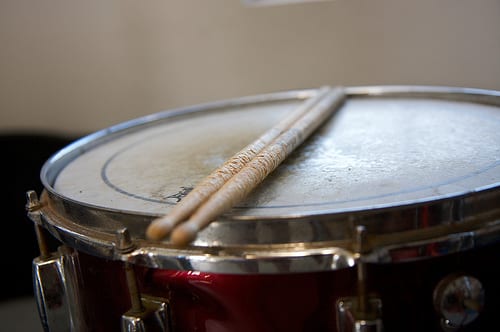 Learning how to play the drums takes a lot of patience, dedication and of course, practice. The technical skills won’t just appear overnight, and neither will the gigs or performances! As you progress in your lessons, there are a few crucial mistakes you’ll want to avoid. Here are a few we can think of…
Learning how to play the drums takes a lot of patience, dedication and of course, practice. The technical skills won’t just appear overnight, and neither will the gigs or performances! As you progress in your lessons, there are a few crucial mistakes you’ll want to avoid. Here are a few we can think of…
1. Not branching out.
As a musician (not only a drummer), you’ll gain a lot more exposing yourself to new and different types of music, rather than limiting yourself to one genre. Even if you play for a prog rock band, listen to everything. And yes, we mean everything. Go to a lot of shows. Talk to a lot of musicians. The more you open your mind – and your ears – the bigger the creative pool you’ll be able to create. This will help whether you’re helping your bandmates compose, improvising some beats, or simply building your networks.
2. Playing too fast, or too loud (or both).
We get it: that drum solo can seem like the best feeling in the world. Everyone’s looking at you, and you can really show off your skills and go a little bit crazy. But the rest of the time, you need to think about your fills as just part of the song’s conversation. You should not sound overpowering or sudden, but rather complimentary to the style of the particular song. Your job is to lead the tune and the audience to the next chorus, phrase or bridge. Moreover, if you’re playing so loud that your bass player can’t hear himself, you’re doing a disservice to the entire band. Learn to play quietly when the situation calls for it, even if it means letting another band member shine.
3. Only listening to yourself.
Similar to above, sitting behind a drum set can be loud (even if you’re not trying to be!). But as a drummer your main priority is to hold the band together – and how can you do that if you’re not listening to everyone else around you? However, that doesn’t mean you’re limited to being a human metronome on auto-pilot. As you practice listening, and reacting to what’s going on around you, eventually your style will become more relaxed and natural. Listening to the other sections, particularly the bass, can also help when you’re creating your own beats.
4. Not warming up before a gig.
Warming up is stressed for other instruments like guitar, but don’t think you’re off the hook! Drummers are susceptible to shoulder and back injuries, especially if you’re playing on a set that hasn’t been adjusted to you. Spend some time warming up, practicing your rudiments and stick exercises, so by the time you sit down to play you are loose, relaxed and ready to go.
5. Ignoring drum notation.
We know it might not be as fun to read music as it is to just start playing whatever you feel like, but knowing how to read drum notation will take you far. Not only will it help you with learning new rudiments and tracking your progress, but your chances of getting booked for certain gigs will increase. Reading music will open up a lot more opportunities for you, and will take you to that next level of true musicianship. From there, the sky’s the limit! Composing, teaching, more auditions and more gigs.
Want to sharpen up your drum techniques even more? Book private drum lessons with one of our instructors and get started!
Like this article? Sign up for email updates for additional music resources, tips and expert advice!
You might also like…
– Drumstick Sizes and Types – And Why It Matters
– Play-Along Strategies for Drum Techniques
– Electronic vs. Acoustic Drums: Which Should I Buy?
Photo by Travis Isaacs.
Suzy S.
